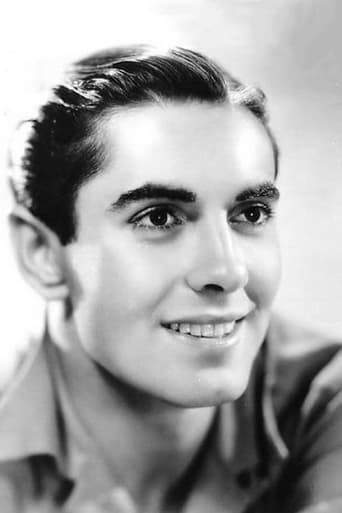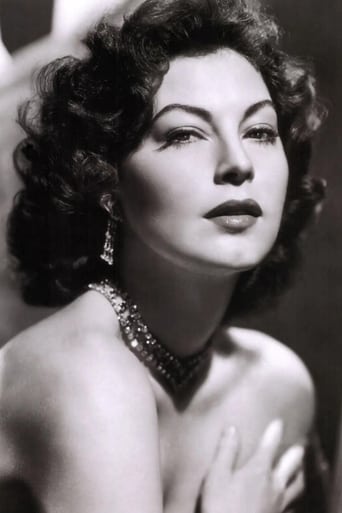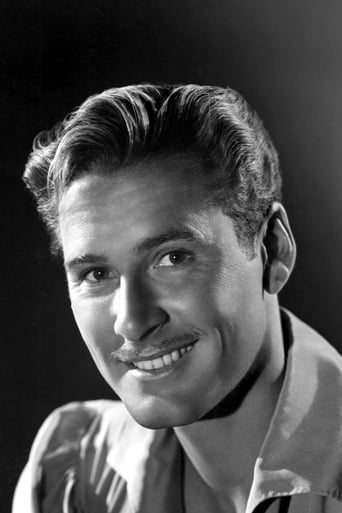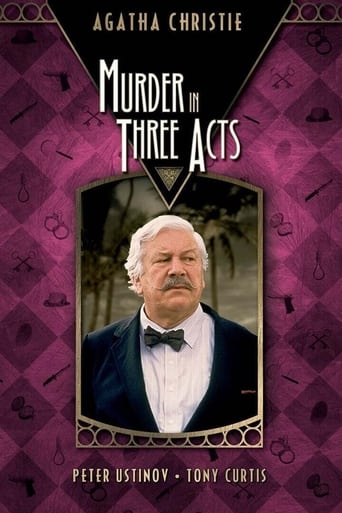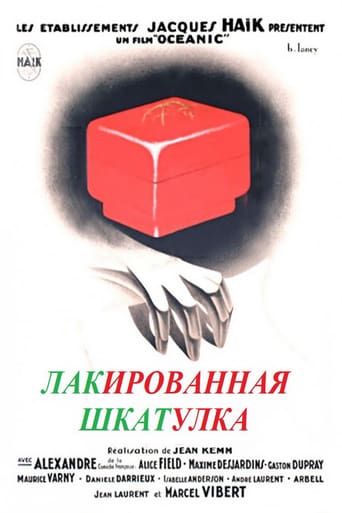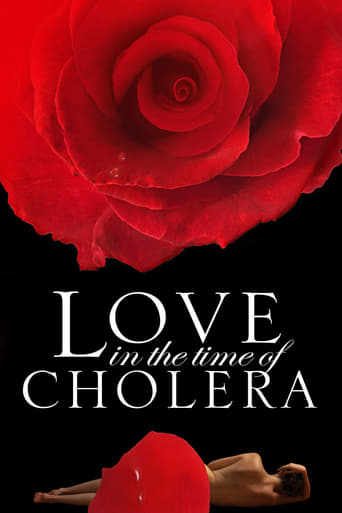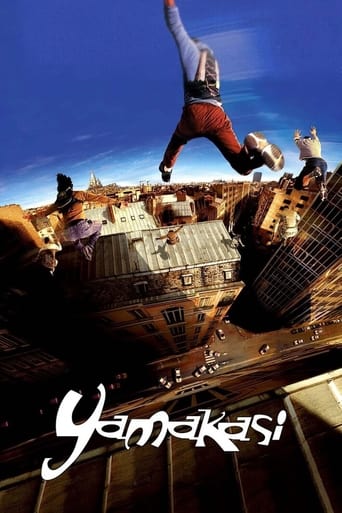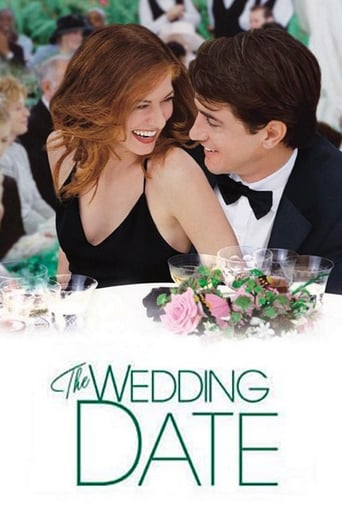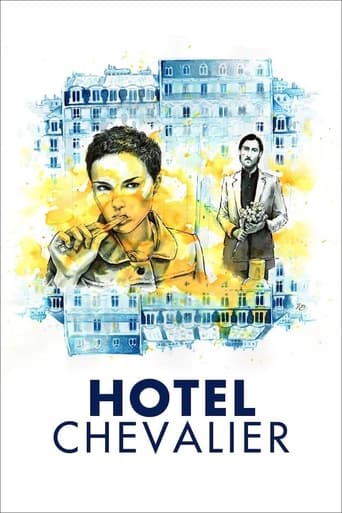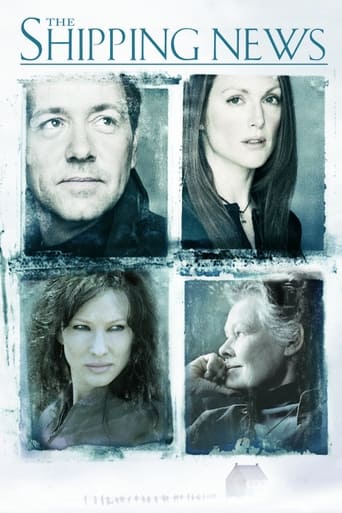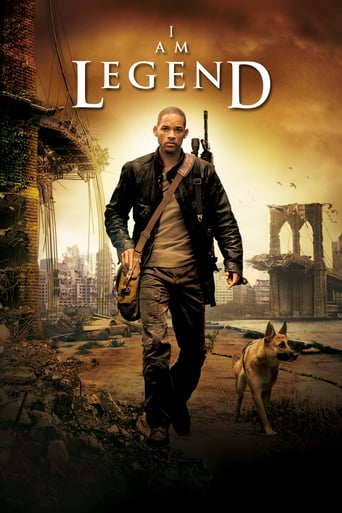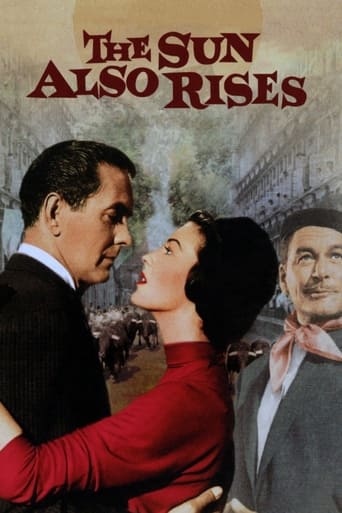
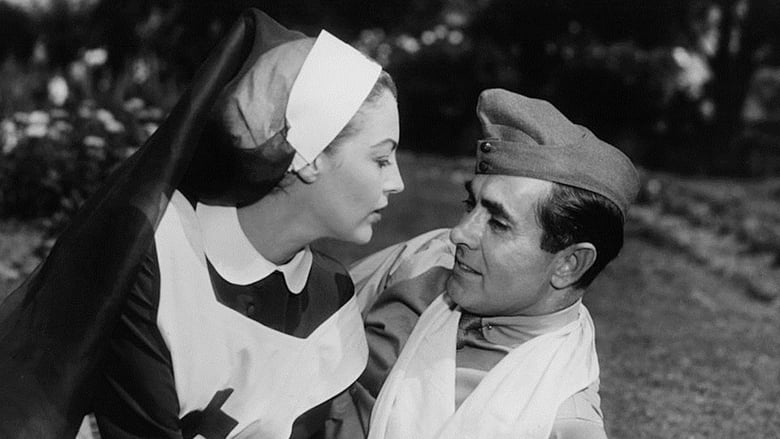
The Sun Also Rises (1957)
A group of disillusioned American expatriate writers live a dissolute, hedonistic lifestyle in 1920's France and Spain.
Watch Trailer
Cast
Similar titles
Reviews
Undescribable Perfection
What a freaking movie. So many twists and turns. Absolutely intense from start to finish.
Great example of an old-fashioned, pure-at-heart escapist event movie that doesn't pretend to be anything that it's not and has boat loads of fun being its own ludicrous self.
An old-fashioned movie made with new-fashioned finesse.
Agree that simply watching the miscast old stars is far more interesting than the story. This however invokes reading much more about those actors and the backstory. That's where the fun begins.
If this is a faithful adaption of Hemingway, I can understand why I've never particularly enjoyed reading him. Of course, a bad Hemingway yarn can still a great film make -- as witness Howard Hawks' "To Have and Have Not." Sadly, Henry King and Co. are not up to the task.The film's characters describe themselves as bohemian war veterans, and there's a feeling that what we're watching is supposed to pass for some form of "disillusion" or maybe even "debauchery." But the sad old person's 1950s style American version of extreme Parisian debauchery makes the beach party movies look like porn. Nobody does anything in this movie except drink too much and say idiotic things, occasionally (but not often enough) get into fights, etc. The performances are not bad at all, especially from Mel Ferrer and Errol Flynn. Everybody is too old for their roles, but that's not really the big problem..... the film is caught up in the same old Hollywood dilemma, of how to present broken-down and tarnished humanity without making the glamorous actors and actresses playing them seem drab. As a result, probably due to King's careful direction, everyone acts as if they are hiding under a wet blanket. There's not a moment in the film where anything seems spontaneous. Ty Power was an excellent actor, but Ron Reagan could have played this role with this director just as well. King doesn't know how to use the widescreen to good effect, so he over-uses medium shots and there are a lot of exterior sequences that just feel like travelogues (Leo Tolver had no particular talent for color photography, and simply saturates the screen).I was surprised that the story basically went nowhere, and nothing was revealed about the characters that wasn't obvious immediately. I like Ava Gardner and Tyrone Power, so I was disappointed that they didn't get to take these characters anywhere interesting. Gardner has none of the spontaneity and shine that she shows off in better films like "Barefoot Contessa", and to get a good performance from Power you need to give him some element of regret or self-loathing. I don't really know who would have made this story believable, though. Everyone says the stars should have been younger, but would this be a good film with, say, Grace Kelly and Rock Hudson? No.
Papa once said that the best way to deal with Hollywood was to meet the producer at the California state line. You throw him the rights to the book and he throws you the check. Then you drive away fast. This large-scale, colorful, and expensive romance certainly has its admirable elements but it's an example of what happens to a popular novel after you throw the rights over to the studio."The Sun Also Rises" was Hemingway's first real novel and in many ways his best. A group of diverse ex pats, mostly American are living in Paris a few years after the end of World War I. (Kids, that's the one that came before World War II.) The narration says they were called "the lost generation" but the fact is that they didn't know it at the time. I believe it was Gertrude Stein that gave them that label in an offhand way and it was picked up much later by the press. Most of them seem to know one another. The must have a lot of money because they leave town whenever they feel like it. "I'm tired of Paris, Jake; let's go to South America," says one.And so they all get away -- to Spain to watch the bulls at Pamplona. I never saw much point in bullfights. You first enrage the animal, then tease him, then torture him with banderillas, then tease him some more, then finally kill him brutally with a sword. Ridiculous. Reminds me of my marriage. Of course the bull is no genius either. If he were smart enough to have the concept of "agency" he'd know that he shouldn't charge the red flag but the thing that is making the red flag wave around, namely the matador.Power is the central figure, as Jake Barnes, rendered impotent by a war wound and therefore unfit for physical love. When Tyrone Power is waked up at four in the morning by a drunken ex girl friend (Gardner) and climbs out of bed (in his pajamas) his hair is still combed and carefully gelled. Not a hair out of place. Don't want him to look scruffy because he's the star. As Barnes, Power is polite but gruff and treats people with indifference. He goes from restaurant to night club to night club but doesn't enjoy himself. He's too old for the part. This is, after all, the Gatsby era we're talking about and that generation was about thirty.Gardner is very good looking, as usual. It's believed that the character was modeled on Lady Duff Cooper, a beautiful socialite of the era. She'd survived the sinking of the Titanic. One member of the mob -- mentioned in the novel's first sentence, is Robert Cohn, a boxing champion at Princeton and a very rich writer manqué. His wardrobe is a perfect fit -- for 1957: a loosely fitting, single-breasted, powder blue suit with a narrow necktie. The women's wardrobe gets more of a nod to historical accuracy but they still come out looking like Hallowe'en costumes somehow. An occasional artist (bearded and bereted) is shown sketching someone, so we know we're supposed to be on la rive gauche, not in Mexico City. Errol Flynn does amazingly well in the role of the proud but pathetic bankrupt who keeps saying aloud what other people are only thinking. The musical score follows suit. When Gardner enters a church to pray for her battered bullfighter, we're treated to a full minute of a heavenly choir, in case we didn't get the point that she was praying in church. Friedhofer did come up a lush and catchy romantic theme though, borrowed for a pop song, "When the World Was Young."I don't know that Hemingway ever saw this movie or, if he did, he didn't laugh. So much of good writing is on the page. Hemingway, who wrote sensitive and action-filled stories, just didn't translate well on the screen -- not that Hollywood made much of an effort. His literary reputation went into eclipse after he died in 1960. I don't know why, though he wrote some clunkers. During the same period, Hemingway's friend and enemy, F. Scott Fitzgerald, by then long dead, underwent some sort of reappraisal and "The Great Gatsby" was reread. Poor Fitzgerald died at forty. It's often said that his books were out of print at the time, but in fact they were all still available but only sold seventeen copies in the year of his death. That's neither here nor there but this film wouldn't have been made in 1956 if the novel had been written by Fitzgerald instead of Hemingway.All in all, it's not a terrible translation of the novel, and it's kept what is maybe the best line. Powers delivers it sarcastically, and the literary Barnes gives it a wistful tone: Jake Barnes' "Isn't it pretty to think so." ("Pretty.")
The actors seem right for these roles, as if they were born to play them. As a result, each character vividly comes to life on screen. Ava Gardner is at her sexiest; Tyrone Power displays his perennial boyish charm; Mel Ferrer infuses his part with the perfect amount of creepiness; Eddie Albert provides some nice comic relief; and Errol Flynn steals the show as an incorrigible drunk (a real stretch for him?). But more important than these characterizations is how the film captures the spirit of Hemingway's writing. It depicts the wanderlust, the excitement and the philosophy of an interesting group of expatriates and their interwoven destinies. When they all go off in separate directions near the end of the picture, the viewer can't help but feel melancholy that their time together is over.
